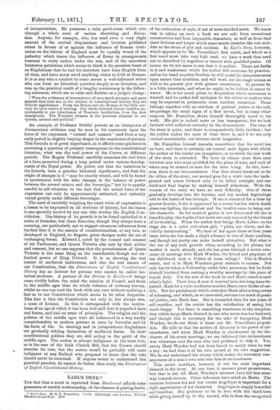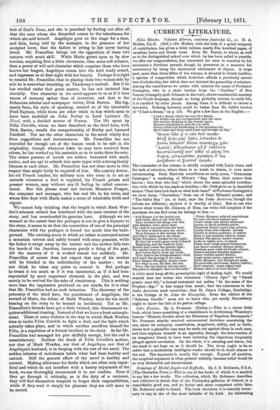EARL'S DENE.*
THE fact that a novel is reprinted from Blackwood affords some guarantee of careful workmanship, of the absence of glaring faults, ■ Earl's Dent. By R. E. Francillon. 3 vole. Edinburgh and London : William Blackwood and Sons. 1870. • of the cultivation of style, if not of more decided merit. We know that in taking up such a book we are safe from sensational monstrosities and from impossible characters, as well as from that sheer dullness and torpor which some minds consider the sole anti- dote to the abuse of plot and incident. In Earl's Dene, however, which appears to be Mr. Francillon's first novel, and which as a first novel must take very high rank, we have a work that need not be described by negatives or treated with qualified praise. Of course we do not mean to say that it is perfect. There are faults in it and weaknesses which the author will overcome by practice, and as his hand acquires freedom he will model his characters more upon nature than tradition, and will work out his single scenes as well as his general plot with greater consistency. At present he is a little uncertain, and when he ought to be boldest he seems to waver. He is too much given to disquisition where movement is wanted, and he makes half apologies to the critics or readers who may be expected to pronounce some incident unnatural. These failings, together with an overdose of poetical justice at the end, are perhaps the usual signs of a first novel, but in many other respects Mr. Francillon shows himself thoroughly equal to his work. His plot is indeed more or less transparent, but we look forward with sufficient curiosity to the denouement. The tone of the story is quiet, and there is comparatively little incident ; but the author makes the most of what there is, and if we are only excited occasionally, our interest never languishes.
Mr. Francillon himself remarks somewhere that his novel has no hero, and there is certainly no► central male figure with which the author or the reader can sympathize, or to which the real work of the story is entrusted. We have to choose more than once between men who seem qualified for the place of hero, and each of whom may be treated as hero for the time being. In this, how- ever, there is one inconvenience: Our first choice turns out to be the villain of the story, our second goes for a while into the back- ground and comes forward only to be killed outright, and our third and final begins by making himself ridiculous. With the women of the story we have no such difficulty. One of them gradually develops into the heroine, and her modest beginnings add to the lustre of her triumph. If she is obscured for a time by greater beauty, if she is oppressed by a secret burden which death alone can lighten, the contrast and the trouble serve to bring out her character. As her musical genius is not discovered till she is forced to play, the depths of her heart are only revealed by the threat of its breaking. When the author first brings Marie Lefort on the stage she is a quiet colourless girl, " plain, not clever, and de cidedly uninteresting." We hear of her again three or four years later, when she has made a slight advance in two of these qualities, and though not pretty can make herself attractive. But what is the use of any such growth when, according to the phrase, her market is made already, and she has gone through a secret cere- mony of marriage with Mark Warden, the friend and playmate of her childhood, now a Fellow of some college ? This is Marie's secret, and it is Mark Warden's great obstacle to success. Not only has he taken a Fellowship under false pretences, but he finds himself hindered from making a wealthy marriage by this piece of boyish folly. For the rest of the book he and Marie stand in each other's light. Their love, if ever it was real love, has long since de- parted. Mark for a while meditates murder, Marie once thinks of sui- cide. But the punishment which overtakes Mark after a long career of scheming, and which, as we have said, savours too much of poeti,
cal justice, sets Marie free. She is rewarded then for her years of self-sacrifice, and the reader has the satisfaction of seeing her made happy. Yet there is something wearisome in the complica- tion which keeps Marie chained to one who never was her husband, and though this is necessary for the sake of hampering Mark Warden, we do not think it bears out Mr. Francillon's proposi- tion. He tells us that the motive of his story is the power of cir- cumstance, and when Mark Warden is checkmated by the dis- closure of his secret marriage, we are informed that circumstance was victorious over the man who had professed to defy it. Yet, surely Mark Warden had not been forced to marry when he was a boy ; he had done it of his own accord, at his own suggestion. We do not understand the theory which makes the necessary con- sequences of a man's own acts into fate or circumstance.
This secret marriage, however, is not the moat important element in the story. At one time it assumes great prominence, but that is not till Mark Warden's schemes have led him some way towards success. Other influences have acted on Marie. The contrast between her and her cousin Angelique is important for a right appreciation of her character. Angelique is simply beautiful and heartless. She professes to be in love with the third hero while giving herself up to the second, who is then the recognized heir of Earl's Dene, and she is punished by finding out after all that the man whom she discarded comes to the inheritance for which she sold herself. Angelique goes on the stage for a time, and fails, being told by the manager, in the presence of her accepted lover, that the failure is owing to her never having loved. Mr. Francillon brings out the opposition of these two natures with much skill. While Marie grows upon us by slow touches, acquiring first a little cleverness, then some self-reliance, then a power of will and character which surprises those who have known her longest, Angelique comes into the field ready armed, and impresses us at first sight with her beauty. Perhaps it is right to remind Mr. Francillon that in placing these two women aide by side he is somewhat trenching on Thackeray's method. But if he has studied under that great master, he has not imitated him slavishly. One character in the novel appears to us as if it bore traces of memory rather than of invention, and that is the Bohemian scholar and newspaper writer, Dick Barton. His big, manly form, his style of speaking, remind us of the inimitable Fred Bayham, while there are other traits in him which seem to have been modelled on John Burley in Lord Lytton's Jly Novel, with a decided savour of Porson. The life spent by Felix Creville, whom we have described as the third hero, with Dick Barton, recalls the companionship of Burley and Leonard Fairfield. Nor are the other characters in the novel wholly free from suggestions and reminiscences. Mr. Francillon has not travelled far enough out of the beaten track to be safe in his originality, though whatever hints he may have received from others, he has worked up his materials so as to make them his own. The minor persons of novels are seldom honoured with much notice, and are apt to subside into mere types with a strong family likeness to each other. Mr. Francillon has not done more in this respect than might fairly be required of him. His country doctor, his old French teacher, his military men who come in to act as seconds whenever a duel is required, his French priests and peasant women, may without any ill feeling be called conven- tional. But this phrase must not include Monsieur Prosper, the composer and manager, who has real life in his veins, and whose first duet with Marie makes a scene of admirable truth and vigour.
We cannot help thinking that the length to which Mark War- den's schemes extend has interfered with the main interest of the story, and has overclouded its genuine hero. Although we are warned at the outset that the prologue is not to give a keynote to the story, it seems to us that the connection of one of the principal characters with the prologue is forced too much into the back- ground. The exciting scene in which an infant is conveyed across a mountain torrent and safely housed with some peasants, while the father is swept away by the torrent and the mother falls into the hands of the Jacobins, becomes purely a thing of the past, till the memory of it is evoked almost too suddenly. Mr. Francillon of course does not expect that any of his readers will be blinded to the individuality of the mother ; we do not think he takes any pains to conceal it. But perhaps he treats it too much as if it was immaterial, as if it had been superseded by more important elements in the plot, and was merely to be revived for the sake of consistency. This is nothing more than the impression produced on our minds, for it is clear that Mr. Francillon had no such intention. The discovery of the paternity of the third hero, the punishment of Angelique, the reward of Marie, the defeat of Mark Warden, have far too much bearing on the story to be treated as incidental. Yet as Mr. Francillon's threads have got a little twisted, this denouement re- quires additional clearing. Instead of that we have a fresh entangle- ment. There is some violence in the way in which Mark Warden tries to incite Felix Creville to fight a duel, and the fight which actually takes place, and in which another sacrifices himself for Felix, is a repetition of a former incident in the story. So far Mr. Francillon had managed his plot skilfully enough, but the end is unsatisfactory. Neither the death of Felix Creville's mother, nor that of Mark Warden, nor that of Angelique, nor that of Angelique's husband, is in keeping with the rest of the novel. The sudden infusion of melodrama taints what had been healthy and natural. Still the general effect of the novel is healthy and natural. Making allowance for faults which are often only super- ficial and which do not interfere with a hearty enjoyment of the book, we can thoroughly recommend it to our readers. Even if they go through it critically, as is the duty of a reviewer, they will find themselves tempted to forget their responsibilities, while if they read it simply for pleasure they are still more to be envied.































 Previous page
Previous page